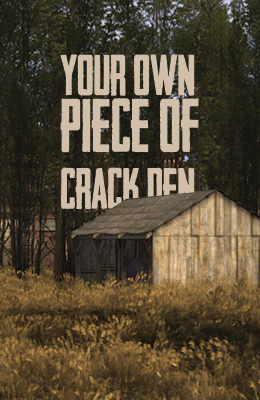For over a decade, Crack Den has been home to characters created by players from around the world. The wild imagination and creativity of the community keeps it thriving.
Read this guide through the bottom of the page and select which path you wish to apply for (Citizen, Campus, or Youth).
For more detailed guidelines and for questions, please check out the sim-guides in our Discord-server (access via the story HUD).
Community Rules
RESPECT OTHERS AND ENJOY YOURSELF! Crack Den is a private community that provides a safe, private, and creative environment to play in. Players seeking to harass or undermine enjoyment for others can be reported through our abuse portal.
GUNS ARE RESTRICTED to players who have earned the Armed privilege. Eligibility can be tracked through your Crack Den Story HUD.
CHARACTERS REPRESENTING YOUTH must apply through the Seaside Youth Center and are strictly prohibited from sex scenes and the adult zone in Hathian.
NON-HUMAN AVATARS ARE RESTRICTED to domestic animals like cats and dogs (and, traditionally, goats), but may be killed in combat. Animesh pets are restricted to non-combative domestic animals. Please help us to limit lag: attach them only for specific scenes and detach them if the sim is full or laggy.
ALT ACCOUNTS are not restricted, with one exception: Gang leads shouldn’t have an alt in the HPD brass group. We expect you to strictly avoid any metagaming and to not use your alt to gain an advantage in RP.
VEHICLES USAGE REQUIRES a paid permit and is subject to limited availability. It is recommended to pick up your vehicle when not in use. Please check in world for more information.
CD GROUPS AND ROLE TITLE ARE EXCLUSIVE to approved groups that have been proposed, peer reviewed, and approved by community leaders.
In-character (IC) vs. Out-of-Character (OOC)
The difference between the character versus the player is important to understand:
In-character (IC) refers to the state and perception of the characters in the story. Basically, it’s what the fictional character, not the actual player, would see, hear, think, and feel.
Out-of-character (OOC) refers to the real life perception of the player. If you need to break character momentarily to explain a detail or simply say “brb”, you should wrap double brackets around the text.
((sorry, need a quick bathroom break!))
^ No need to emote when double parenthesis-wrapping OOC chat.
Powergaming
If a player’s primary goal is to win, they are likely a “powergamer” and wouldn’t last long in the Crack Den.
The term “powergaming” refers to an unfair advantage a player creates for their character. In combat scenes, it is commonly seen as a character who is able to frequently dodge attacks, perform ninja-like moves and combo hits in a single post, has unreasonable strength, or attempts to dictate the resulting injury for their opponent. Good practice: Don’t make more than two (defensive or offensive) moves per emote.
/me immediately dodges the sheriff’s baton. He then picks up a rock, and throws it at the officer’s head, knocking him out cold.
^ Not only does the player decide to dodge the hit, but they also dictate the result of the attack on the sheriff.
/me tumbles backwards, reeling from intense pain, as the baton cracks over their shoulder. “Augghh,” he yells and crashes to the ground. Without thinking, he then grabs the closest rock he can find, aims it at the sheriff, and let’s it fly with all their might.
^ The player takes the hit in good spirit and only makes an attempt to hit his opponent. Attacks should always be written as an attempt to give your opponent a chance to post their reaction.
Metagaming
The term “metagaming” refers to players using knowledge of a story or environment, gained outside of role-play, to their character’s advantage. It is a form of powergaming and is not allowed.
A common example of this is when a player has their character greet another character simply by reading their avatar name. That is a basic form of metagaming because from the character’s point of view, they’re strangers to one another and never learned of the other character’s name through role-play before.
Players should exercise caution when learning details of a story and make sure their character’s action is only based on role-play that actually occurred.
Consent & Limits
For scenes that impose long-term consequences, please consult with the player first. If you’re not comfortable with a scene, you must inform the other player immediately and work something out (ie. fade-to-black or escape plan).
Limits should never provide an unfair advantage. For example, if a character is in a situation with a gun to their head, the victim must yield reasonably instead of relying on a “no death” limit to force their opponent into a no-win situation.
Take Turns & Emote (/me)
Players in the Crack Den must always emote and take turns writing posts. A post always starts with the /me command and usually includes up to several sentences that describe a character’s physical and verbal actions combined.
Scenes are efficient and fair when the following posting rules are observed:
Single Posts Only
/me picks up a tire rod from the ground.
/me then aims it at the police officer and throws it at him.
/me yells, “Take that!”
^ Posting multiple times in a row creates confusion.
/me picks up a tire rod that was laying on the ground. He then turns to face the police officer, aims, and hurls it in his direction. “Take that!” he yells.
^ Consolidating your thoughts into a single post is the way to go.
Write in Third Person (e.g. he, she, they)
/me looks at you and licks my lips. I then say, “I’ve had my eye on you…”
^ Writing in first person just reads too personal, and is often seen as creepy…
/me looks at the woman and licks his lips. He then says, “I’ve had my eye on you…”
^ Writing in third person point of view reads as if the character is speaking and not the player.
Post and Wait Turn
To start a new scene or join in an existing one, move your avatar into position and observe for at least one post round. When writing an entrance into the scene, be sure to address the characters you want to interact with.
Register Your Character
Where will your character’s journey begin? Depending on the kind of scenes you enjoy playing and character age, we have a few starting paths for you to consider:
 Everyone starts here… trying to make ends meet by any means necessary. Just depends on how far you’d be willing to go.
Everyone starts here… trying to make ends meet by any means necessary. Just depends on how far you’d be willing to go.
 Alcohol, drugs, parties, scandals, and the secrets … it’s just part of campus life in the Deep South.
Alcohol, drugs, parties, scandals, and the secrets … it’s just part of campus life in the Deep South.
 Growing up on the streets ain’t easy. Pick your friends wisely … is blood really thicker than water?
Growing up on the streets ain’t easy. Pick your friends wisely … is blood really thicker than water?
